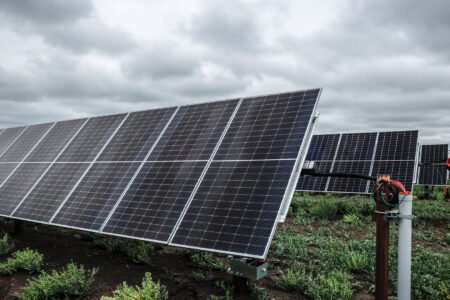
The past 12 months have roiled the global oil and gas industry. A stunning crash in commodity prices, vocal resistance to megaprojects, and calls for stronger climate policies from insurers and banks have all raised questions about the sector’s long-term outlook. They have similarly altered the picture for Canada, where oil and gas has been an economic keystone for decades.
What do Canadians think about the role oil and gas should play in Canada’s energy future, and how polarized is the conversation?
At Positive Energy, an energy research program at the University of Ottawa, we work on answering these questions. Last year, we designed a unique survey to benchmark and track polarization on climate and energy issues. Our latest round of analysis explores public opinion on the present and future of oil and gas in Canada, the role of federal and provincial governments in energy and climate, and how party affiliation, ideology, region, gender, and age may influence opinions on these topics.
Ideology is a new addition to the analysis. We sorted Canadians into quartiles using questions gauging their views on a range of social and economic issues (1st quartile is the most right wing, 4th quartile the most left wing). The key finding? Ideology appears to be the second strongest predictor of polarized opinion, but issues are still polarized by party affiliation far more than any other factor. This suggests that cues and rhetoric from political parties and other influential actors may be amplifying and exacerbating the extent of ideological differences among Canadians.
The results also point to many areas of agreement. Canadians overwhelmingly self-identify as moderate. They agree on the importance of oil and gas to Canada’s economy, and support environmentally responsible development of the sector. They also want the federal government to demonstrate leadership on energy and climate issues, with some flexibility afforded to the provinces.
Before digging into the numbers, a few definitions. What do we mean by “polarized” opinion? It comes down to the extent of disagreement. When views are polarized on an issue, it means the public doesn’t just disagree about something, they disagree strongly. Views are hardened and concentrated at either end of a spectrum. When opinion is fragmented, meanwhile, people disagree, but their views are distributed more evenly across the spectrum. This distinction is crucial for decision-makers looking to chart a path forward for Canada’s energy and climate future. Polarized opinions tend to be difficult for political systems to deal with, whereas fragmented opinions lend themselves better to compromise and finding common ground. (For a comprehensive explanation of the difference between polarized and fragmented opinion, see here.)
Our results reveal a number of issues where Canadians broadly agree — for example on the current and future importance of oil and gas to the nation’s economy (figure 1).
This consensus holds regardless of party affiliation, ideology, region, gender or age, which may seem surprising. Canadians also generally agree that oil and gas will be an important part of Canada’s future economy, though less strongly. Here, there are big differences along ideological lines that tend towards being polarized. Among the most right-wing quartile of Canadians who offered an opinion (figure 2), 32 percent believe oil and gas will be extremely important to Canada’s economic future (76 percent believe oil and gas will be at least fairly important); among the most left-wing quartile, only 10 percent believe this will be the case (and only 38 percent say oil and gas will be at least fairly important).
Opinion is polarized when we sort for party preference (figure 3), with stark differences at the extreme ends of the spectrum between the Conservative Party and the other national parties.
When we dig deeper into the specifics of the future, we find some areas of strong agreement. For instance, all demographics support the proposition that exporting natural gas to displace emissions abroad is one of the most important things Canada can do to address climate change (figure 4). There is similarly strong agreement that Canada should use public resources to retrain workers who may lose their jobs as a result of climate policy (figure 5). Interestingly, there is little variance in response to these questions based on party affiliation, ideology, region, gender or age. Here, policy-makers have two clear policy areas with the potential to unify the country while advancing Canada’s energy and climate agenda.
Canadians are moderately supportive of expanding oil and gas production, but the level of support depends on how the question is posed. Respondents agree that Canada should expand oil and gas production if there is an environmental rationale for doing so — in other words, if the country can produce oil and gas with lower emissions than other countries. Canadians are particularly supportive of natural gas exports if they can displace higher-emitting energy sources like coal.
However, opinion is fragmented on expanding oil and gas production based on economics alone. We asked the same question prefaced with the statement “since global demand for oil and gas is rising…” – an assumption that may require a closer look following the pandemic – and support was not as strong. However, despite the moderate agreement for these questions, we again find that responses are polarized along partisan lines and tend toward polarized along ideological lines.
In contrast to expanding oil and gas production, a potential phase-out of oil and gas is predictably controversial. When asked if phasing out oil and gas is necessary (figure 6), opinion is fragmented overall. Forty-one percent of Canadians at least slightly agree that technological improvements will render a phase-out unnecessary, while 34 percent at least slightly disagree. More Canadians in the Prairies tend to agree with this statement, but there is moderate agreement on this issue across regional lines.
We also sought Canadians’ views on the role of federal and provincial governments in determining Canada’s energy future. As with previous surveys, we find strong agreement among Canadians that it falls to the federal government to develop a long-term energy vision (figure 7). There is also moderate agreement that the federal government has a role in how energy resources are developed in provinces. When asked if provinces should be able to address climate change as they see fit, Conservative and Bloc voters are more likely to agree.
We note an important caveat to these results. This survey predates the onset of COVID-19. The long-term effects of the pandemic on Canadian views of energy and climate change are unclear. But given the volatility of our times, these results offer a useful baseline to track how the pandemic is influencing public opinion, and whether attitudinal shifts are related to ideology, region, partisanship or other factors.
Overall, the results suggest that Canadians are generally optimistic that Canada can align climate action with oil and gas development — including through ambitious climate policies, a growing and environmentally responsible oil and gas sector, and a strong export market that reduces emissions abroad. Canadians also want the federal government to develop a long-term vision for the country’s energy and climate future, while leaving provinces some latitude to implement their own climate strategies.
The findings also point to potential sources of conflict. During the 2019 federal election, political parties drew sharp contrasts over their energy and climate platforms, the carbon tax and pipelines being two salient examples. The narrative that Canadians are polarized gained steam after the Liberals were shut out of Alberta and Saskatchewan — two landlocked, energy-producing provinces. Political parties appear to be picking up on these ideological differences and tapping into them to gain an edge. In a policy space as emotionally charged as climate and energy, that is cause for concern.
Overall, however, Canadians’ attitudes on energy and climate issues are not as polarized as many believe. There is some room for optimism here. The findings suggest Canadians’ views are fragmented or polarized far less often than one might expect by age, gender, ideology, and even region. When it comes to crafting a common vision and executing the details, the results suggest that building a multi-generational, pan-Canadian coalition may indeed be possible. Conflict is inevitable, but leaders have the opportunity to articulate common policy goals and build on values shared by many Canadians.
The survey was conducted online between September 9-29, 2019 using Qualtrics Services. We surveyed 2,679 Canadians with five regional subsamples of over 500 (BC, Prairies, Ontario, Quebec, Atlantic Canada). Margin of error is not applicable for this survey type, but a traditional survey with this sample size would yield a margin of error of +/- 2 percent for the national sample and +/- 4 percent for regional subsamples. Graphic analysis (90+ slides) for this discussion is available on Positive Energy’s website.
Brendan Frank, interim research director and senior research associate at Positive Energy, also contributed to this piece.
Photo: An oil refinery in Burnaby, British Columbia. Shutterstock by Lijuan Guo.













